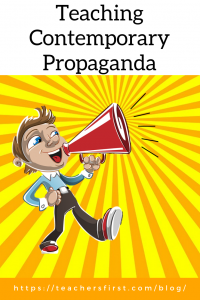Propaganda is a word that usually brings to mind historic posters and speeches used to convey political messages, especially during wartime. According to the Concise Oxford English Dictionary, Propaganda is “Information, especially of a biased or misleading nature, used to promote a political cause or point of view.” As educators, we need to recognize that propaganda exists today and prepare our students to be able to analyze information to identify and contend with propaganda in its various forms.
Mind Over Media is a one-stop site designed to provide teachers and students (ages 11 and up) with the tools to recognize and respond to modern-day propaganda. The site not only provides lesson plans and general information about propaganda but also serves as a place to curate examples which provides you with an opportunity to examine propaganda, rate its potential impact, and comment on it allowing a chance to share interpretations with others.
Modern lesson plans abound about propaganda. Some are topic-specific, from commercials to political ads to proliferation of hate to dogfighting. Civics connections are plentiful. There are even units available that explain how to redefine our teaching about propaganda.
Students learn best from applying what we have taught them. Teach students to create posters, commercials, or some other type of medium that relays a message. Games are also another way for students to show what they know. Propaganda by AGLOA.org is a question and response game with versions for elementary through high school. You can play the online version here. Bad News is an online game that places students as the creators of disinformation, and the object of the game is to gather as many followers as possible without losing too much credibility.
Propaganda is not new. As educators we need to recognize that contemporary propaganda is prevalent every day for our students and adjust our teaching accordingly. Remember to check out the previous posts in our TeachersFirst media literacy blog series and our media literacy collection.


